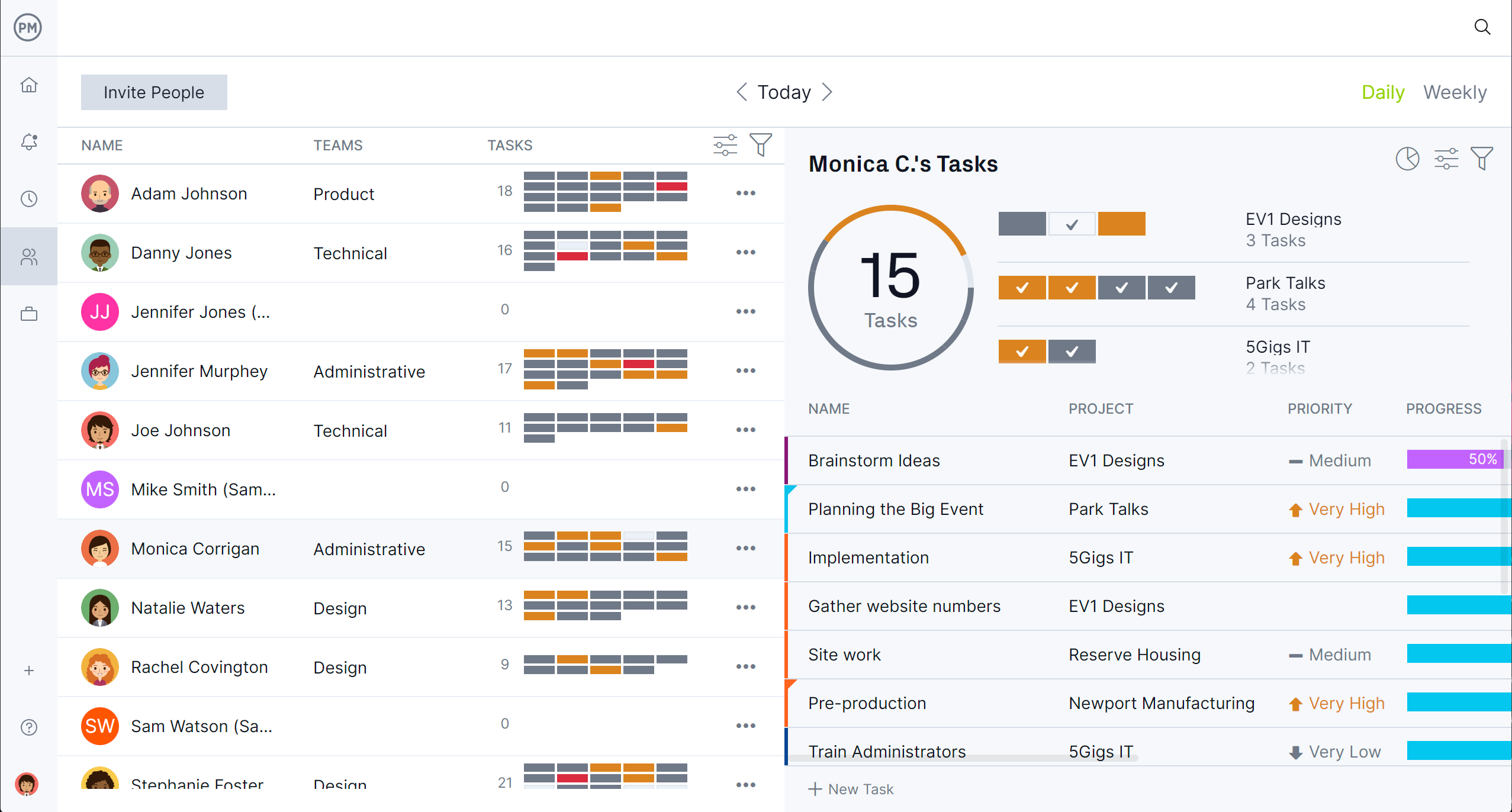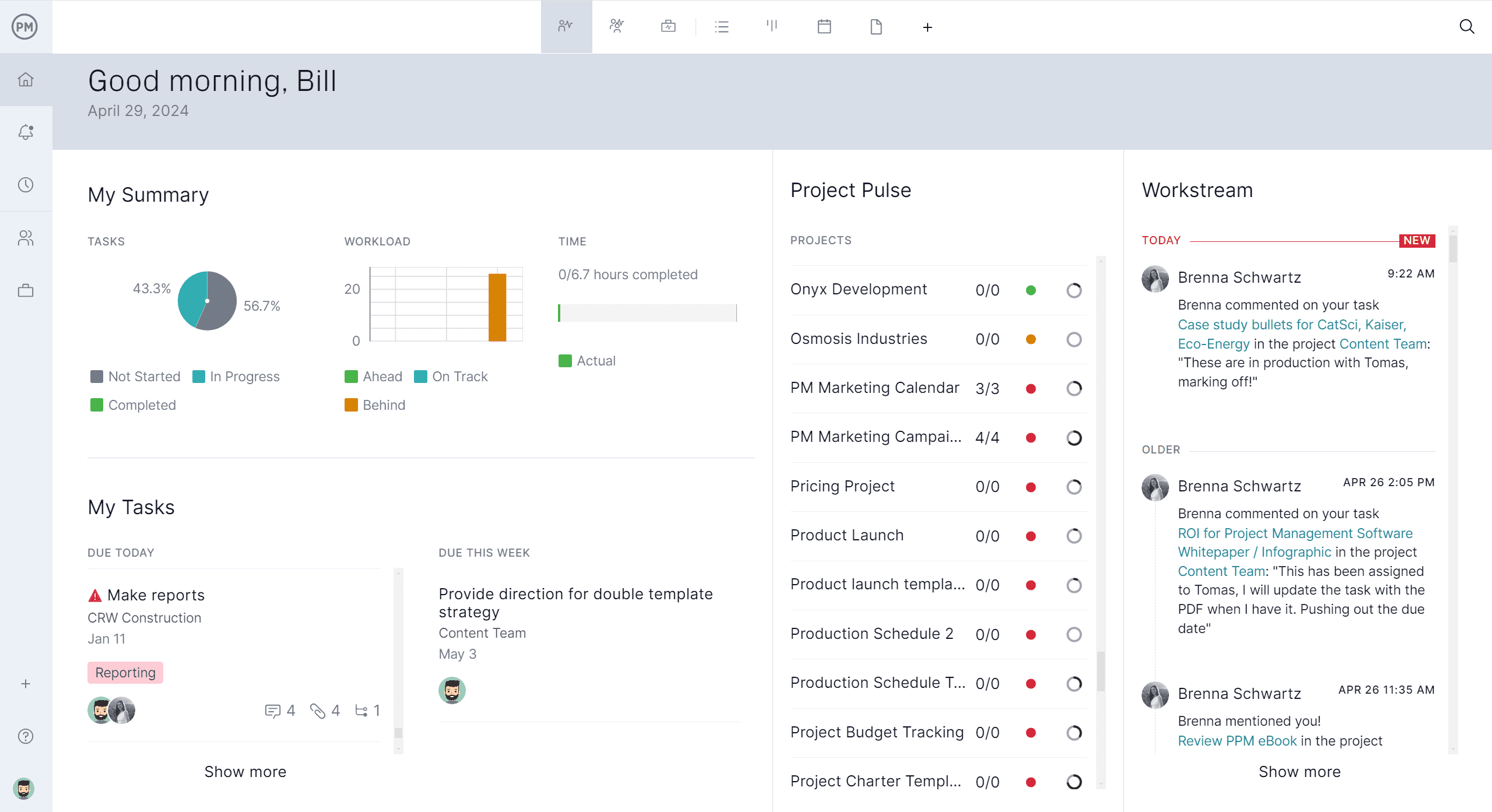All organizations, including businesses, government agencies, nonprofits, military, healthcare and education organizations, use project management to achieve their goals. The importance of project management lies in its ability to provide structure, improve efficiency and deliver results. Without it, organizations risk wasting resources and missed objectives. This article explores the importance of project management and why it’s crucial for every type of organization.
Why Is Project Management Important?
In this section, we’ll outline 10 reasons why project management is important for all types of organizations, including businesses, government agencies, nonprofits, military, healthcare and education organizations. Understanding these reasons will highlight the value project management brings to achieving organizational goals effectively.
1. Better Work Planning
All the organizations mentioned above need to execute tasks to achieve their goals, which is why project management is essential for effective work planning. It allows them to identify the work that needs to be done by breaking it down into smaller, manageable parts, often using tools like a work breakdown structure (WBS).
This detailed planning helps ensure that no task is overlooked and that the scope is well-defined. Once the work is identified, project management also helps determine the resources—people, materials and budget—needed to complete it successfully. With these elements in place, organizations can create a realistic and coordinated schedule to guide the work from start to finish.
The work management aspect of project management ensures that activities are planned logically, resources are allocated properly and everyone involved understands their responsibilities, enabling the organization to move efficiently toward its objectives.
There are project management tools that are essential to improving work planning. A Gantt chart helps by visually organizing tasks along a timeline, making it easy to see when each task starts and ends and how they relate to one another. It shows dependencies between tasks so teams can identify the order of work and prevent scheduling conflicts. By breaking down the project into phases and assigning deadlines, a Gantt chart helps allocate resources effectively, track progress and adjust plans as needed to stay on schedule. This clear overview supports better coordination, communication and time management across the team.
ProjectManager’s Gantt chart improves work planning by linking all four types of task dependencies—finish-to-start, start-to-start, finish-to-finish and start-to-finish—so teams can create accurate schedules that prevent conflicts and avoid cost overruns. It includes filtering for the critical path, which highlights tasks with zero slack that directly affect the project timeline, helping managers focus on high-risk areas. The ability to set a baseline allows teams to track planned progress against actual performance so they can spot delays or budget issues early and make informed adjustments to keep the project on track. Get started with ProjectManager today for free.
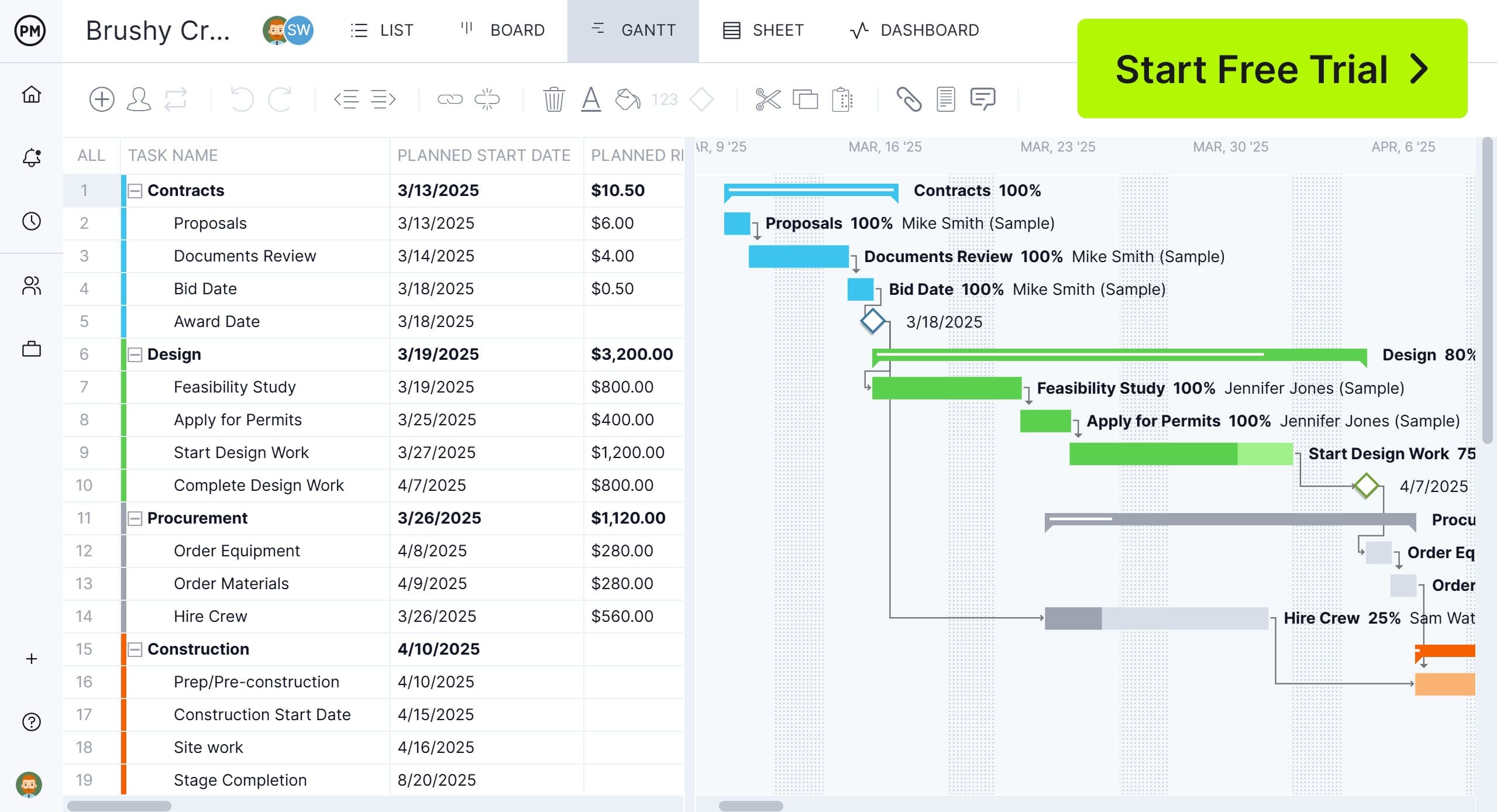

2. Allows Organizations to Achieve Business and Strategic Goals
Most organizations create a strategic plan to guide their medium to long-term goals, outlining where they want to be in the future. Project management helps turn these aspirations into reality by providing a structured way to develop and execute plans that align with the strategy.
It bridges the gap between high-level vision and actionable steps, ensuring that every project contributes to the organization’s overall objectives. With clear planning, tracking and execution, project management enables organizations to stay focused on their priorities, measure progress effectively and achieve their strategic and business goals successfully.
3. Efficient Use of Organizational Resources
Organizations have limited resources, and using them wisely is crucial for achieving goals. Project management helps ensure that people, time and materials are used where they create the most value. By organizing work thoughtfully, it prevents overlap, reduces idle time and avoids unnecessary costs.
Teams know what needs to be done, when it should happen and who is responsible, which keeps efforts focused and productive. Progress is tracked along the way, so adjustments can be made before issues escalate. This approach not only maximizes the potential of available resources but also builds confidence among stakeholders that projects are being executed efficiently and responsibly, contributing to the overall success of the organization.


4. Helps Identify and Manage Risks
Uncertainty is a part of every project, and being prepared for potential challenges is key to success. Project management equips organizations with the ability to foresee what could go wrong before it happens. By thoroughly analyzing the work ahead, teams can pinpoint areas where risks are likely to arise and assess their possible impact.
This proactive approach to risk management makes it easier to craft strategies that minimize disruptions and keep the project moving forward. When risks are identified early and plans are in place to address them, organizations can respond confidently instead of reacting in crisis. This not only protects resources and timelines but also strengthens trust among stakeholders, ensuring that even unexpected issues are handled effectively and efficiently.
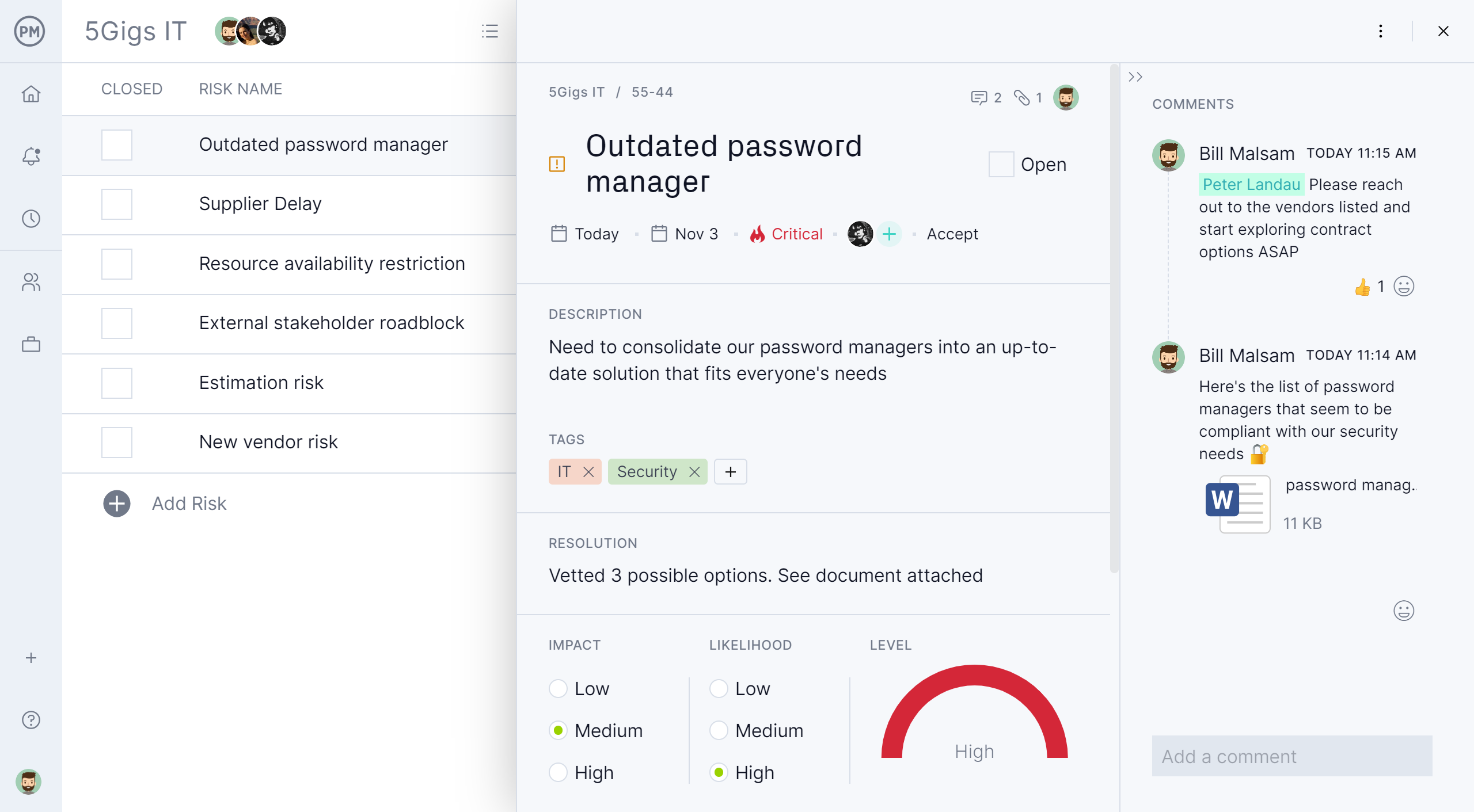

5. Promotes a Collaborative Environment for Cross-functional Teams
Most projects in organizations bring together people from different departments, each with unique expertise and responsibilities. Without proper coordination, this diversity can lead to confusion or conflict. Project management fosters a collaborative environment by clearly defining roles, responsibilities and expectations for everyone involved. Team members understand how their contributions fit into the larger picture and who to turn to for support or information.
This clarity encourages open communication, reduces misunderstandings and strengthens cooperation across functional areas. By providing a structured approach, project management helps teams work together efficiently, leveraging their combined skills to achieve project goals. This collaboration not only improves project outcomes but also builds stronger relationships between departments and creates a more cohesive organizational culture.
6. Provides a Structured Approach for Monitoring Progress
Tracking progress is essential for ensuring that organizational initiatives stay on course. Project management offers a clear structure to monitor strategic initiatives, work plans and other activities effectively.
By defining measurable milestones and setting clear timelines, it becomes easier to evaluate how much has been accomplished and what remains. This visibility allows teams to identify delays, adjust plans when needed and keep stakeholders informed. With regular monitoring, organizations can maintain focus on their goals, quickly address any challenges and ensure that every step contributes to the overall success of their projects and strategic objectives.
7. Facilitates Quality Assurance and Control
Delivering high-quality results is crucial for any organization, and project management helps make that possible. By setting clear expectations from the start, teams understand what standards their work must meet.
Throughout the process, progress is reviewed to ensure outcomes remain aligned with these expectations, and adjustments are made when necessary. This ongoing attention to detail helps catch issues early, reducing costly mistakes and rework. With everyone aligned on what success looks like, teams can focus their efforts on producing results that not only meet but often exceed what was envisioned, strengthening the organization’s reputation and stakeholder confidence.
8. Helps Organizations Estimate and Manage Costs
Managing costs effectively is a critical part of delivering successful projects. Project management enables organizations to anticipate what resources will be needed and estimate how much they will cost before work begins. With a clear understanding of requirements, teams can build a realistic budget that reflects both planned activities and potential contingencies.
Throughout the project, expenses are closely monitored against this budget, allowing teams to identify variances early and take corrective action when necessary. This disciplined approach not only helps prevent overspending but also builds trust with stakeholders by demonstrating financial responsibility. In the end, it ensures that resources are used wisely and goals are achieved within the financial constraints set at the outset.
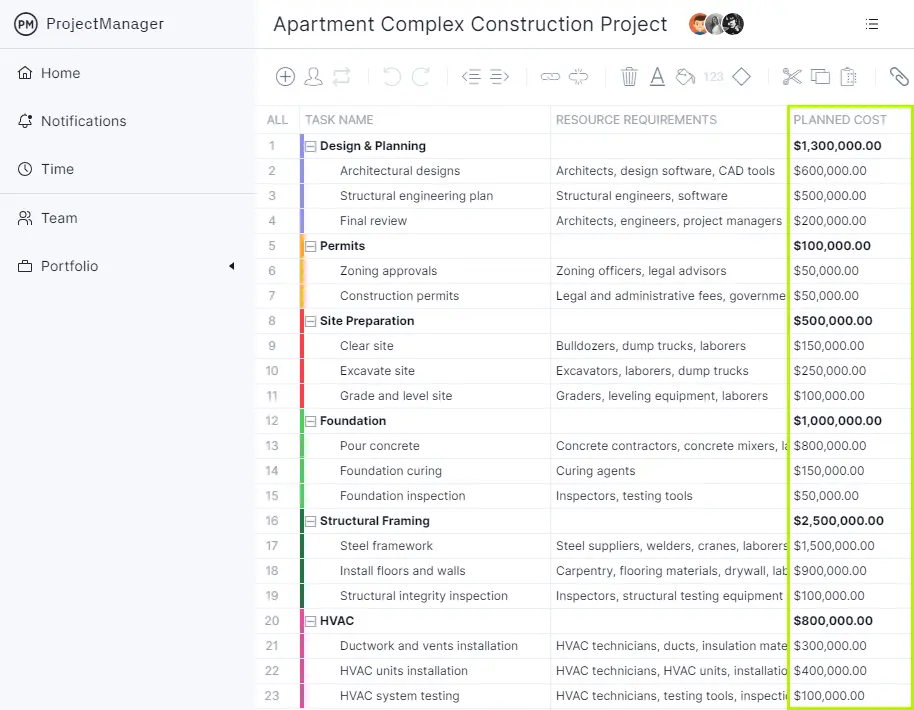

9. Allows Organizations to Meet Deadlines
Meeting deadlines is essential for maintaining credibility and ensuring projects deliver value on time. Project management helps organizations achieve this by identifying all necessary tasks and estimating how long each will take.
These tasks are then organized into a coherent timeline that accounts for dependencies and resource availability. During execution, progress is monitored carefully to ensure that milestones are being met as planned. Project scheduling techniques like the program evaluation and review technique (PERT) and the critical path method (CPM) are often used to analyze timelines, optimize schedules and adjust when delays threaten to occur. By keeping everyone focused, aligning efforts and anticipating potential bottlenecks, project management helps organizations meet even the most challenging deadlines without compromising on quality.
Related: Best Project Management Software of 2025
10. Promotes Transparency and Accurate Reporting
Transparency and accurate reporting are vital for managing expectations and maintaining stakeholder trust. Through effective monitoring, project management allows organizations to track the performance of employees and teams in real time. Regular project reports offer a clear and honest view of progress, highlighting achievements, pending tasks and any obstacles.
These reports also provide detailed insights into how resources are being used, how costs are tracking against the budget and whether timelines are being met. This clarity helps decision-makers identify issues early, make informed adjustments and keep everyone aligned. With accurate information at hand, organizations foster accountability and improve overall project outcomes.


Importance of Project Management by Organization Type
Project management benefits every kind of organization by bringing structure, clarity and efficiency to their initiatives. Whether focused on profit, service or societal impact, all organizations rely on well-managed projects to achieve their goals effectively, optimize resources and deliver meaningful results to their stakeholders and communities.
Businesses (For-Profit Organizations)
For businesses, project management is essential to staying competitive and profitable. It helps companies plan and execute projects that increase revenue, improve efficiency and bring new products or services to market. By managing costs, deadlines and quality, businesses can deliver consistent results that meet customer expectations while maximizing return on investment and sustaining growth.
Government Agencies
Government agencies use project management to deliver public services, infrastructure and programs effectively. It helps them coordinate complex initiatives, manage taxpayer resources responsibly and ensure accountability. With project management, agencies can balance regulatory compliance with efficiency, meet deadlines and deliver projects that serve the community’s needs while maintaining transparency and public trust.
Nonprofit Organizations
Nonprofits rely on project management to make the most of limited budgets and resources while fulfilling their missions. It helps them organize volunteers, manage donations and implement programs that create meaningful social impact. With clear planning, accountability and measurement, nonprofits can demonstrate results to donors, improve outcomes and serve their communities more effectively.
Military and Defense Organizations
Military and defense organizations depend on project management to execute complex, high-stakes missions with precision. It enables them to coordinate large teams, manage vast resources and meet strict timelines under pressure. By ensuring planning, risk management and accountability, project management helps these organizations achieve operational readiness, maintain security and complete critical defense initiatives.
Healthcare Organizations
Healthcare organizations use project management to improve patient care, implement new technologies and comply with regulations. It helps them streamline processes, allocate resources efficiently and deliver projects on time, such as opening new facilities or launching health programs. With structured planning and oversight, healthcare providers can enhance outcomes, reduce costs and adapt to evolving needs.
Educational Institutions
Educational institutions apply project management to improve operations, develop programs and enhance learning environments. It supports them in organizing construction projects, curriculum updates and technology integration. By managing resources wisely, setting priorities and tracking progress, project management enables schools and universities to meet objectives, serve students effectively and create positive educational experiences.
Free Project Management Templates
The importance of project management should encourage those involved in projects to invest in project management software. But for those who aren’t ready to upgrade, these free project management templates can be useful. Though not as powerful as software, they can still help with planning, budgets and reporting.
Project Plan Template
Download this free project plan template to outline the key elements needed to plan and manage a project from start to finish. It includes sections for project goals, scope, timeline, tasks, resources, budget and risk management. By using a template, teams can standardize planning, stay organized and ensure that all critical details are documented and communicated clearly to stakeholders.
Project Budget Template
Use this free project budget template to estimate, allocate and track the costs associated with a project. It includes sections for labor, materials, equipment, overhead and contingency expenses. This template helps teams organize financial details, monitor spending and stay within budget throughout the project lifecycle.
Project Status Report Template
This free project status report template is a structured document used to regularly communicate the progress, performance and health of a project to stakeholders. It includes sections for key updates, completed tasks, upcoming milestones, budget status, risks and issues. This template helps keep everyone informed, aligned and able to make timely decisions based on current project data.
How to Manage Projects With ProjectManager
ProjectManager manages projects with multiple management views by giving teams flexible ways to plan, execute and track work based on their roles and preferred workflows. The Gantt chart provides a visual timeline for scheduling tasks, setting dependencies and managing deadlines. The kanban board helps teams track task progress through stages, making it ideal for managing workflows and visualizing bottlenecks. The calendar view organizes tasks by due dates to support time-based planning and daily coordination.
The sheet view offers a grid layout for users who prefer working with data in a spreadsheet format. The list view breaks projects into detailed, actionable items that are easy to sort and update, making it especially useful for task management and team check-ins. All views are connected to the same real-time data, so updates in one view are instantly reflected across the platform, ensuring alignment and transparency across the entire project team.
Plan, Allocate and Track Resources
Use our resource management features to effectively keep projects on time and within budget. Availability settings let managers assign work based on each team member’s actual working hours and time off to prevent overbooking. The color-coded workload chart shows who is over or underassigned so workloads can be balanced quickly to avoid burnout or delays.
The team page centralizes all resource data, including roles, task assignments and capacity, making it easy to see who is doing what and where adjustments are needed. These tools work together to improve efficiency, support accurate planning and ensure the right people are working on the right tasks at the right time.
Monitor Every Aspect of the Project in Real Time
Tracking features help teams monitor project metrics in real time to stay on schedule and within scope. Live dashboards provide instant visibility into progress, costs and workloads so managers can spot issues early and make quick adjustments.
Customizable reports offer deeper insights into specific metrics like task completion, budget performance and resource use to support data-driven decisions. Secure timesheets track actual hours worked for accurate cost control and accountability. Together, these tools keep projects transparent, responsive and aligned with goals from start to finish.
Related Project Management Content
The importance of project management is too big a subject for one blog. For readers interested in learning more, check out the links below. There are articles on tools, techniques, soft and hard skills, plus a lot more.
ProjectManager is online project and portfolio management software that connects teams whether they’re in the office or out in the field. They can share files, comment at the task level and stay updated with email and in-app notifications. Join teams at Avis, Nestle and Siemens who are using our software to deliver successful projects. Get started with ProjectManager today for free.




